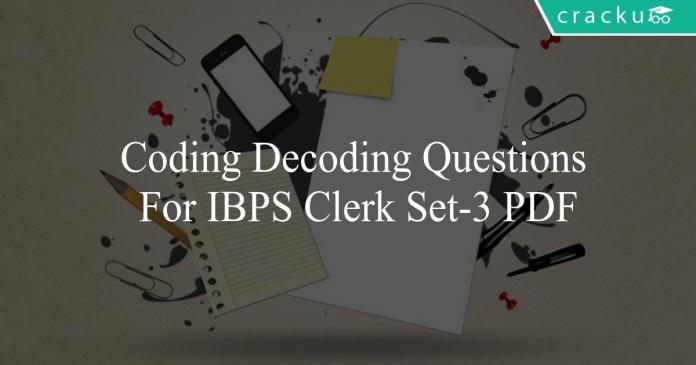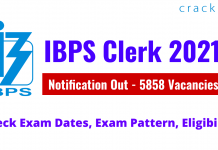Coding Decoding Questions For IBPS Clerk Set-3 PDF
Download important Coding Decoding Questions PDF based on previously asked questions in IBPS Clerk and other Banking Exams. Practice Coding Decoding Question and Answers for IBPS Clerk Exam.
Download Coding Decoding Questions For IBPS Clerk Set-3 PDF
Get 25 IBPS Clerk mocks for Rs. 149. Enroll here
Take Free IBPS Clerk Mock Test
Download IBPS Clerk Previous papers PDF
Go to Free Banking Study Material (15,000 Solved Questions)
Instructions
In each question below is given a group of digits followed by four combinations of letters or symbols (a),(b)(c) and (d). You have to find out which of the combinations correctly represent the group of digits based on the coding system and the conditions given below and mark the number of that combination as your answer. If none of the combinations correctly represents the group of digits mark (e) i.e ‘None of these’ as your answer
Digits 5 1 3 4 9 6 8 2 7
code P A K % R @ D © M
Conditions:
(i) If the first digit is odd and the last digit is even the codes for the first and last digits are to be interchanged
(ii) If both the first and the last digits are even both are to be coded as $\bigstar$
(iii) If both the first and the last digits are odd both are to be coded as $.
Question 1: 813469
a) RAK%@D
b) DAK%@R
c) M%RD©A
d) $\bigstar$AK%@$\bigstar$
e) None of these
Question 2: 794821
a) MR%D©A
b) AR%D©M
c) M%RD©A
d) $R%D©$
e) None of these
Question 3: 591426
a) @RA%©P
b) PRA%©@
c) @AR%©P
d) $RA%©$\bigstar$
e) None of these
Instructions
Study the following information to answer the given questions:
In a certain code, ‘always create new ideas ‘ is written as ‘ba ri sha gi’ ideas and new thoughts’ is written as ‘fa gi ma ri’ ‘create thoughts and insight’ is written as ‘ma jo ba fa’, and ‘new and better solutions’ is written as ‘ki ri to fa’.
Question 4: What is the code for ‘ideas’ ?
a) sha
b) ba
c) gi
d) ma
e) Cannot be determined
Question 5: What does ‘fa’ stand for ?
a) thoughts
b) insights
c) new
d) and
e) solutions
Question 6: ’fa lo ba’ could be a code for which of the following ?
a) thoughts and action
b) create and innovate
c) ideas and thoughts
d) create new solutions
e) always better ideas
Question 7: What is the code for ‘new’ ?
a) ki
b) ri
c) to
d) fa
e) ba
Question 8: Which of the following may represent ‘insights always better’ ?
a) jo ki to
b) ki to ri
c) sha jo ri
d) to sha jo
e) sha to ba
Question 9: What is the code for ‘thoughts’ ?
a) ma
b) fa
c) ba
d) jo
e) Either jo or fa
IBPS Clerk Important Questions PDF
Free Banking Study Material (15,000 Solved Questions)
Instructions
Study the information to answer the given questions ?
In a certain code
‘very large risk associated’ is written as ‘nu ta ro gi’’
‘risk is very low’ is written as ‘gi se nu mi’,
‘is that also associated’ is written as ‘ta mi po fu’,
‘inherent risk also damaging’ is written as ‘fu nu di yu’,
(All codes are two letter codes only)
Question 10: Which of the following represents ‘risk also large’ ?
a) nu fu po
b) nu gi ro
c) ro po ta
d) fu nu ro
e) ro yu fu
Question 11: What is the code for ‘very’ ?
a) ta
b) fu
c) ro
d) nu
e) gi
Question 12: What is the code for ‘associated’ ?
a) mi
b) ta
c) ro
d) gi
e) nu
Question 13: What does the code ‘di’ stand for ?
a) Either ‘damaging’ or ‘inherent’
b) inherent
c) also
d) low
e) risk
Question 14: Which of the following represents ‘that is low’ ?
a) po mi du
b) se po mi
c) ta mi po
d) se po nu
e) ta mi se
Question 15: In a certain code language ‘TERMINAL’ is written as ‘NSFUMBOJ’ and ‘TOWERS’ is written as ‘XPUTSF’. How is ‘MATE’ written in that code?
a) FUBN
b) UFNB
c) BNFU
d) BNDS
e) None of these
Question 16: ‘ERID’ is related to ‘DIRE’ in the same way as ‘RIPE’ is related to………..?
a) EPIR
b) PERI
c) EPRI
d) PEIR
e) IPRE
Instructions
In each question below, a group of digits/symbols is given, followed by four combinations of letters numbered (1), (2), (3), and (4). You have to find out which of the combinations (1), (2), (3) and (4) correctly represents the group of digits/symbols based on the following coding system and the conditions those follow and mark the number of that combination as your answer. If none of the four combinations correctly represents the group of digits/symbols, mark (5) i.e.,’None of these’ as the answer
Digit/Symbol 5 9 @ © 3 8 1 $ % 4 2 6 * 7 $\delta$ #
Letter Code B E P A K D F H Q I R J U M V T
Conditions
(a) If the first unit in the group is an even digit and the last unit is a symbol, both these are to be coded as the code for the symbol.
(b) If the first unit in the group is an odd digit and the last unit is an even digit, their codes are to the unchanged.
(c) If both the first and the last units in the group are symbols, both these are to be coded as ‘X’.
Question 17: @91$26
a) JEFHRP
b) PEFHRP
c) XEFHRX
d) PEFHRJ
e) None of these
Question 18: 387#©9
a) KMDTAE
b) KDMATE
c) EDMTAK
d) KDMTAK
e) None of these
Question 19: 4@312$\delta$
a) VPKFRV
b) VPKFRI
c) XPKFRX
d) IPKFRV
e) None of these
Question 20: %4187*
a) QIFDMU
b) UIFDMQ
c) XIFDMX
d) UIFDMU
e) None of these
Daily Free Banking Online Tests
Answers & Solutions:
1) Answer (B)
The data given to us is:
Digits 5 1 3 4 9 6 8 2 7
code P A K % R @ D © M
Conditions:
(i) If the first digit is odd and the last digit is even the codes for the first and last digits are to be interchanged
(ii) If both the first and the last digits are even both are to be coded as $\bigstar$
(iii) If both the first and the last digits are odd both are to be coded as $.
Here, by choosing proper symbols, we get code as: DAK%@R.
2) Answer (D)
The data given to us is:
Digits 5 1 3 4 9 6 8 2 7
code P A K % R @ D © M
Conditions:
(i) If the first digit is odd and the last digit is even the codes for the first and last digits are to be interchanged
(ii) If both the first and the last digits are even both are to be coded as $\bigstar$
(iii) If both the first and the last digits are odd both are to be coded as $.
As both the digits are odd, they can be coded as $.
Only option D has $ at the end. Hence, the correct option is D.
3) Answer (A)
The data given to us is:
Digits 5 1 3 4 9 6 8 2 7
code P A K % R @ D © M
Conditions:
(i) If the first digit is odd and the last digit is even the codes for the first and last digits are to be interchanged
(ii) If both the first and the last digits are even both are to be coded as $\bigstar$
(iii) If both the first and the last digits are odd both are to be coded as $.
Here, 5 is odd and 6 is even, there symbols would be reversed.
591426 would be coded as @RA%©P
Hence, option A is correct.
4) Answer (C)
By analysing the relation between the given sentences and the codes we can deduce following codes and their words.
ideas=gi,
and=fa,
new=ri,
create=ba,
thoughts=ma,
insights=jo,
always= sha,
better solution= ki so.
Hence, the correct option is C.
5) Answer (D)
By analysing the relation between the given sentences and the codes we can deduce following codes and their words.
ideas=gi,
and=fa,
new=ri,
create=ba,
thoughts=ma,
insights=jo,
always= sha,
better solution= ki so.
Hence, and stands for fa. Option D is correct.
6) Answer (B)
By analysing the relation between the given sentences and the codes we can deduce following codes and their words.
ideas=gi,
and=fa,
new=ri,
create=ba,
thoughts=ma,
insights=jo,
always= sha,
better solution= ki so.
Here, fa= and and ba= create. Only ‘innovate (lo)’ is new word.
Hence, option B is correct.
7) Answer (B)
By analysing the relation between the given sentences and the codes we can deduce following codes and their words.
ideas=gi,
and=fa,
new=ri,
create=ba,
thoughts=ma,
insights=jo,
always= sha,
better solution= ki so.
Hence, option B is correct.
8) Answer (D)
By analysing the relation between the given sentences and the codes we can deduce following codes and their words.
ideas=gi,
and=fa,
new=ri,
create=ba,
thoughts=ma,
insights=jo,
always= sha,
solution= so,
better = to.
Hence, option D is correct.
9) Answer (A)
By analysing the relation between the given sentences and the codes we can deduce following codes and their words.
ideas=gi,
and=fa,
new=ri,
create=ba,
thoughts=ma,
insights=jo,
always= sha,
solution= so.
Hence, option A is correct.
10) Answer (D)
From the intersection of the first two information, we can conclude that “nu” and “gi” will either “Risk” or “very”.
From the intersection of the first and third information, we can conclude that “ta” will mean “associated”.
From the intersection of first and fourth information, “nu” will mean “risk” and hence, “gi” will mean “Very”
“ro” will be “large” and “fu” means also
Hence, answer will be D
11) Answer (E)
From the intersection of the first two information, we can conclude that “nu” and “gi” will either “Risk” or “very”.
From the intersection of the first and third information, we can conclude that “ta” will mean “associated”.
From the intersection of first and fourth information, “nu” will mean “risk” and hence, “gi” will mean “Very”
12) Answer (B)
From the intersection of the first two information, we can conclude that “nu” and “gi” will either “Risk” or “very”.
From the intersection of the first and third information, we can conclude that “ta” will mean “associated”.
Hence, answer will be “B”
13) Answer (A)
From the intersection of the first two information, we can conclude that “nu” and “gi” will either “Risk” or “very”.
From the intersection of the first and third information, we can conclude that “ta” will mean “associated”.
From the intersection of first and fourth information, “nu” will mean “risk” and hence, “gi” will mean “Very”
“ro” will be “large” and “fu” means also
Now for the fourth information, there will be no intersection for the word damaging and inherent. Hence, code “di” either will be “damaging” or “inherent”.
14) Answer (B)
From the intersection of the first two information, we can conclude that “nu” and “gi” will either “Risk” or “very”.
From the intersection of the first and third information, we can conclude that “ta” will mean “associated”.
From the intersection of first and fourth information, “nu” will mean “risk” and hence, “gi” will mean “Very”
“ro” will be “large” and “fu” means “also”
“se” will be “low” and “po” will be “that”
Hence, answer will be B
15) Answer (C)
while coding ‘TERMINAL’, for first four letters, every letter will change to its next letter in alphabetical series and 1st and the fourth letter will exchange their positions and 2nd, 3rd will exchange their positions. Similarly, next four letters will also follow the same pattern. Hence, code will be ‘NSFUMBOJ’
Now for “MATE”, we will change the letters according to above-stated pattern only. M will be N, A will be B and they will exchange their positions. T will be U and E will be F and they will also exchange their positions.
Hence, answer will be C
16) Answer (A)
ERID is DIRE written in reverse form.
Hence, we can obtain EPIR by writing RIPE in reverse form.
Option A is correct.
17) Answer (D)
Here, the first digit is symbol and the last digit is a number and therefore no conditions apply.
This @91$26 can be coded as PEFHRJ.
The correct option is D.
18) Answer (E)
Here, the first digit is odd and last one is even, their is no change in the code.
Now, 387#©9 will be coded as KDMTAE.
But, none of the option match
Hence, the correct option is E i.e none of these.
19) Answer (A)
The code starts with even digit and ends with symbol. Hence, the code for symbol will be used for both digit and symbol.
Hence, the correct coding of 4@312$\delta$ will be VPKFRV.
The correct option is A.
20) Answer (C)
The first and last in the groups are symbols and hence, both will be coded as ‘X’.
Therefore, %4187* will be coded as XIFDMX.
The correct option is C.
Highly Rated Free Preparation App for Banking Exams
We hope this Coding Decoding questions and answers for IBPS Clerk preparation will be helpful to you.





